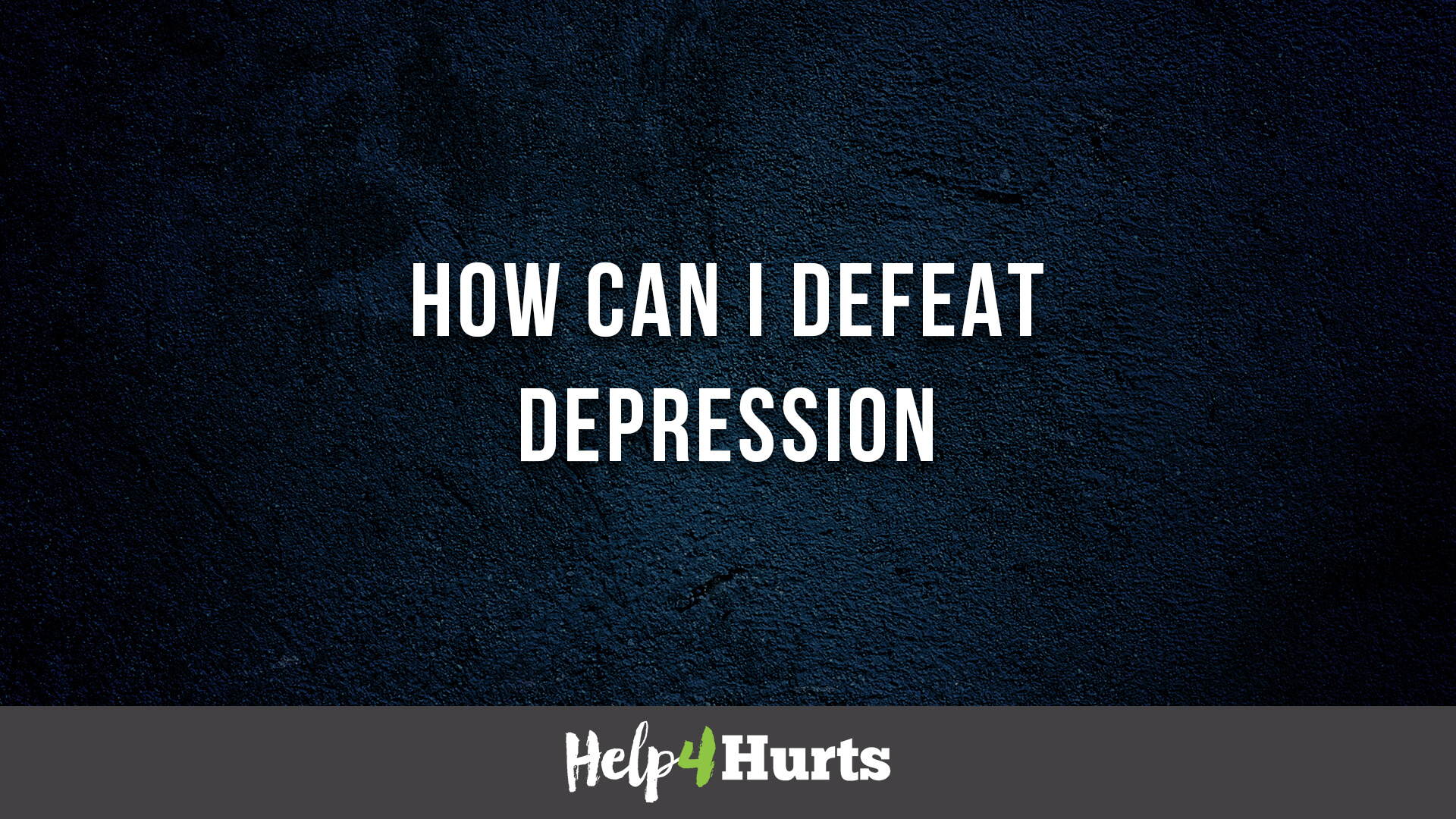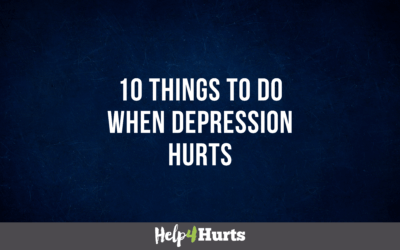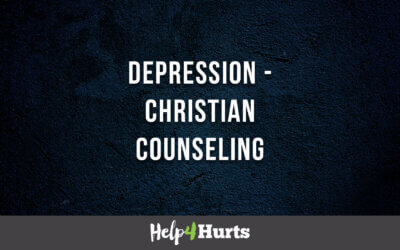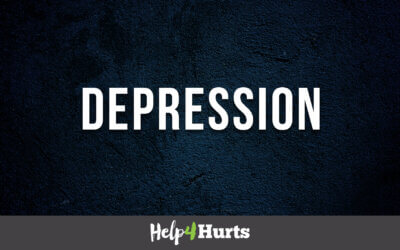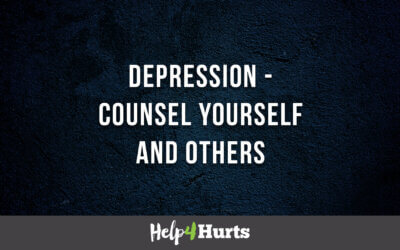Depression is one of the great problems in the world today. It has been called the common cold of emotional illnesses. Everybody gets depressed at times, but some people are depressed nearly all the time. Even great saints get depressed, and Elijah was just such an example.
Elijah was a tremendous spokesman for God. For three years he had been God’s mouthpiece to the nation of Israel. All kinds of miracles had taken place, and there was a spiritual awakening in his nation which had been going after pagan idols.
But one person who did not like Elijah was Jezebel, the Queen of Israel. A very wicked woman, Jezebel hated Elijah, partly because he had so much influence. After one particularly great miracle performed by Elijah, Jezebel’s husband, King Ahab, told Jezebel everything that Elijah had done. This made her so angry that she sent a messenger to Elijah saying, “May the gods deal with me, be it ever so severely, if by this time tomorrow I do not make your life like that of one of them” (1 Kings 19:2). She was saying, “If I don’t kill you within twenty-four hours, I’ll be ready to kill myself.”
Here’s the Elijah who had been fearless for three years, and now, when one woman threatens his life, he becomes frightened, runs out to the desert, and gets depressed (1 Kings 19:3-5). He comes to a broom tree, sits down under it, and prays that he might die. “I have had enough, Lord. Take my life. I am no better than my ancestors.”
 Elijah was a prime candidate for depression. He was physically tired, he was emotionally exhausted, and somebody had threatened his life. He was an emotional fruit basket at this point, with all kinds of problems: fear, resentment, guilt, anger, loneliness, and worry. But God says that “Elijah was a man just like us” (James 5:17). He had the same problems we do, and in this case he had a problem with depression.
Elijah was a prime candidate for depression. He was physically tired, he was emotionally exhausted, and somebody had threatened his life. He was an emotional fruit basket at this point, with all kinds of problems: fear, resentment, guilt, anger, loneliness, and worry. But God says that “Elijah was a man just like us” (James 5:17). He had the same problems we do, and in this case he had a problem with depression.
Elijah was so depressed that he was ready to die. Why do we get ourselves in such emotional messes? Because of faulty thinking. The fact is that our emotions are caused by our thoughts.
If you think in a negative way, you’re going to feel depressed. Your emotions are caused by how you interpret life. If you look at life from a negative viewpoint you’re going to get down.
If you want to get rid of negative emotions you have to change the way you think. The Bible says that you can be transformed by the renewing of your mind (Romans 12:2). The only way you can change your mind and emotions is by changing the way you think. To overcome depression you’ve got to get your incorrect attitudes about life corrected. That’s why Jesus said that when you “know the truth … the truth will set you free” (John 8:32). If you look at things from the right point of view, you will not be depressed.
 Why did Elijah get depressed? He played four mental games that all of us play when we get depressed. The first one is found in 1 Kings 19:3: “Elijah was afraid and ran for his life.” He came to a broom tree, sat under it, and prayed that he might die: “Lord, I’ve had enough. I’m fed up. I don’t want to put up with it anymore. I’m just wasting my life. I’m trying to be Your servant, but nobody’s doing what’s right. I’m fed up; it’s no use trying; I’m giving up.”
Why did Elijah get depressed? He played four mental games that all of us play when we get depressed. The first one is found in 1 Kings 19:3: “Elijah was afraid and ran for his life.” He came to a broom tree, sat under it, and prayed that he might die: “Lord, I’ve had enough. I’m fed up. I don’t want to put up with it anymore. I’m just wasting my life. I’m trying to be Your servant, but nobody’s doing what’s right. I’m fed up; it’s no use trying; I’m giving up.”
What was his first mistake? The same mistake we make when we get depressed: We focus on our feelings rather than on the facts. That always happens when we’re depressed. We focus on how we feel rather than on reality. Elijah felt like a failure because of one incident that frightened him. He thought to himself, “I’m such a coward. What am I doing running?” So because he felt like a failure, he assumed he was a failure.
This is called emotional reasoning, and it’s destructive. It’s the idea, “I feel it, so it must be true.” Musicians, athletes, and TV stars, to name some, know that often after a performance they feel as though they’ve flopped. Yet they also know that they must learn to ignore those feelings because feelings aren’t always true. Feelings are not facts; they are highly unreliable.
A few weeks after one man had been married to his wife, one morning he woke up and said, “You know, Honey, I just don’t feel married.” She replied, “It doesn’t matter, Buddy. You are!”
I don’t always feel close to God, either, but this doesn’t necessarily mean that I’m far away from Him. I don’t always feel like a Christian, but I am one. Feelings often lie, so when we focus on our feelings rather than on the facts, we’re going to get into trouble. For instance, after we’ve made a mistake in one area we tend to feel we’re total failures in life. That’s a misconception. Everybody is entitled to make mistakes, and we can fail in one area without being a failure as a person.
Most psychologists believe that one key to health is to get your feelings out in the open. Become aware. Vent your feelings. Get them out. But that’s not the complete answer, because feelings are unreliable. The Bible doesn’t tell us to get in touch with our feelings but to get in touch with the truth, because it’s the knowledge of the truth that sets us free.
 The second mistake Elijah made is shown in the second thing he said: “I’ve had enough, Lord. Take my life, because I’m no better than my ancestors.” A second mistake that causes depression is that we start comparing ourselves with other people. Most of us have fallen into the trap of thinking, “If I could just be like so-and-so, I’d be happy.”
The second mistake Elijah made is shown in the second thing he said: “I’ve had enough, Lord. Take my life, because I’m no better than my ancestors.” A second mistake that causes depression is that we start comparing ourselves with other people. Most of us have fallen into the trap of thinking, “If I could just be like so-and-so, I’d be happy.”
When you start comparing yourself with other people, you’re asking for trouble. The Bible says it’s unwise and harmful (2 Corinthians 10:12). Don’t compare yourself with somebody else, because everyone is unique. There’s only one person that you can be, and that is you. If you’re always trying to imitate other people and act like them, you’re going to get depressed. The only person you can be is you. That’s all God wants. That’s all He expects.
When we start comparing ourselves with other people we fall into another trap: we tend to compare our weaknesses with other people’s strengths, forgetting that those people also have weak areas that we might be strong in. We also try to motivate ourselves through criticism and condemnation. We do it by “shoulding” ourselves: “I should be able to be like that person. I should be able to act better. I should be able to accomplish it. I should be able to stop it”-as if whipping ourselves verbally is going to motivate us! Nagging doesn’t work when you do it to another person, and self-criticism doesn’t work either.
Recently my wife spoke at a Christian conference, and as I drove her there she made a profound statement: “We don’t read the Bible to change God’s opinion of us; we read the Bible to change our opinion of God.” If I feel that I’ve got to read the Bible so God will like me, then reading the Bible becomes something I’m pressured to do, and we usually resist things we feel pressured to do. When somebody pushes at me my tendency is to push back. But when I realize that I read the Bible not to change God’s opinion of me but to have my opinions about Him changed—understanding what He is like, how loving and gracious He is—then I want to read it.
Another trap we fall into when we get depressed is that we label ourselves. Instead of saying, “I made a mistake,” we say, “I’m a total failure.” Instead of saying, “Oh, I accidentally tripped,” we say, “I’m a klutz.” Instead of saying, “I ate too much,” we say, “I’m a pig.” When we label ourselves with titles, it only reinforces our problems and makes things worse.
 The third mistake Elijah made was that he blamed himself for negative events that weren’t his fault. Elijah said, “I have been very zealous for the Lord God Almighty. The Israelites have rejected Your covenant, broken down Your altars, and put Your prophets to death with the sword” (1Kings 19:10). He said, in effect, “I’ve worked hard for three years, but they’re still not any closer to You. I’ve really tried, but they’re still living the same way as before.” In his depression Elijah blamed himself for failing to change the nation. He took it personally. A third mistake that causes depression is that we take false blame. When you do that you will always get depressed. If we assume a responsibility that God never intended us to have, it is too heavy a burden.
The third mistake Elijah made was that he blamed himself for negative events that weren’t his fault. Elijah said, “I have been very zealous for the Lord God Almighty. The Israelites have rejected Your covenant, broken down Your altars, and put Your prophets to death with the sword” (1Kings 19:10). He said, in effect, “I’ve worked hard for three years, but they’re still not any closer to You. I’ve really tried, but they’re still living the same way as before.” In his depression Elijah blamed himself for failing to change the nation. He took it personally. A third mistake that causes depression is that we take false blame. When you do that you will always get depressed. If we assume a responsibility that God never intended us to have, it is too heavy a burden.
If you’re in the habit of helping people, you sooner or later realize that people do not always respond the way you would like them to, whether it’s your children or your friends or your spouse or people you work with. People react in many different ways. You can’t assume responsibility for their responses.
God has given each of us a free will. When you assume responsibility for other people’s decisions, you accept a burden that will only depress you. You can sometimes influence people, but you cannot control them.
The final decision is theirs. Don’t be depressed by something you cannot control.
 The fourth mistake Elijah made is that he exaggerated the negative. He said, “I am the only one left, and now they are trying to kill me too” (1 Kings 19:10). Elijah held a little pity party for himself: “Everybody’s against me.” But the fact was that everybody was not against him. Only one person was violently against him, and her threat wasn’t a real threat. If Elijah had just thought about it instead of listening to his feelings, he would have realized that Jezebel didn’t dare kill him. True, the Queen sent a messenger with the threat, “Tomorrow I’m going to kill you.” But if Jezebel had really intended to kill Elijah she wouldn’t have sent a messenger to warn him; she would have just sent a hit man!
The fourth mistake Elijah made is that he exaggerated the negative. He said, “I am the only one left, and now they are trying to kill me too” (1 Kings 19:10). Elijah held a little pity party for himself: “Everybody’s against me.” But the fact was that everybody was not against him. Only one person was violently against him, and her threat wasn’t a real threat. If Elijah had just thought about it instead of listening to his feelings, he would have realized that Jezebel didn’t dare kill him. True, the Queen sent a messenger with the threat, “Tomorrow I’m going to kill you.” But if Jezebel had really intended to kill Elijah she wouldn’t have sent a messenger to warn him; she would have just sent a hit man!
Jezebel was too clever to have Elijah killed. She recognized his powerful influence. If Elijah had been killed he would have become a martyr. That would have increased his influence and probably caused a revolution in the country. Besides that, she was probably afraid of what God would do to her if she touched His man. So her words were just a threat. She let him get away to the desert because she didn’t really want to kill him. She just wanted to make him look like a coward in front of the nation.
But Elijah didn’t stop to evaluate the threat. He just ran away. When we’re depressed we always exaggerate the negative. Everything looks bad. If we’re depressed, the whole world is going to pot. In actuality, Elijah was not the only person still faithful to God. There were still 7,000 prophets who hadn’t succumbed to the pagan religion (1 Kings 19:18). Elijah exaggerated the problem, and it made his depression worse.
 What was God’s remedy for Elijah’s depression? It was a remedy you can use for your depression. First, take care of your physical needs. We read that Elijah laid down under a tree and fell asleep. Then an angel touched him and said, “Get up and eat.” He looked around, and there by his head was a cake of bread baked over hot coals and a jar of water. So he ate and drank, and went back to sleep.
What was God’s remedy for Elijah’s depression? It was a remedy you can use for your depression. First, take care of your physical needs. We read that Elijah laid down under a tree and fell asleep. Then an angel touched him and said, “Get up and eat.” He looked around, and there by his head was a cake of bread baked over hot coals and a jar of water. So he ate and drank, and went back to sleep.
Then the angel came a second time and said, “Get up and eat again, for the journey is too much for you.” So he ate and drank, and was strengthened by that food (1 Kings 19:5-8).
God’s initial remedy for Elijah’s depression was rest, food, and relaxation. Sometimes a good night’s sleep does wonders for your attitude. When you are physically tired and mentally drained, you’re prone to depression. Notice how tenderly God dealt with Elijah. God did not scold him by saying, “You coward! What are you doing here in the desert?” God didn’t put him down or condemn him; all God did was give him food and rest. God got him restored physically. That was the starting point. If you’re depressed, the first step toward recovery is to get in shape physically. Take care of your health needs. Maybe you need to watch your diet or perhaps you need to get more sleep or begin an exercise program. Physical health has a profound influence on your moods.
 The second remedy for your depression is to give your frustrations to God. Elijah then went into a cave and spent the night there. In the morning the Lord asked him, “What are you doing here, Elijah?”
The second remedy for your depression is to give your frustrations to God. Elijah then went into a cave and spent the night there. In the morning the Lord asked him, “What are you doing here, Elijah?”
He replied, “I’ve been zealous for the Lord God Almighty. Israel has rejected Your covenant, broken down Your altars, and put all Your prophets to death with the sword; I’m the only one left, and now they’re trying to kill me too” (1 Kings 19:9-10). He just poured out all his inner feelings. God allowed him to let off steam. God was not shocked by Elijah’s complaints.
God says, in effect, “When you’re uptight, let Me hear your inner emotions. I already know what they are, and I’m not going to be shocked by them.” He let Elijah vent his pent-up emotions without criticizing him or condemning him. Often it helps to share your feelings with a Christian friend. It’s a catharsis-a cleansing out, a venting, of all the things that have been pushed down inside you and are causing your depression.
Notice the six emotions that Elijah felt. First, Elijah was afraid (1 Kings 19:3). Then he felt resentment (1 Kings 19:4). He said, “I’m fed up with it all, and I’m no better than my ancestors.” He also had low self-esteem and felt guilty. Next Elijah complained that he worked hard for nothing (1 Kings 19:10). He was angry. Then he said, “I’m all alone” (1 Kings 19:10). He was lonely. Finally he added, “And they’re trying to kill me too.” He was worried. When you combine resentment, fear, guilt, anger, loneliness, and worry, you’re asking for depression!
So God just let him spill this all out. He said, “Elijah, what’s frustrating you? What’s eating you up?” When you are depressed that’s exactly what you need to do, tell it all to the Lord.
 The third remedy for your depression is to get a fresh awareness of God’s presence in your life. The Lord told Elijah, “Go out and stand on the mountain in the presence of the Lord, for I am about to pass by” (1 Kings 19:11). Then a powerful wind tore the mountains apart and shattered the rocks, but the Lord wasn’t in the wind. After the wind came an earthquake, but the Lord wasn’t in the earthquake either. After the earthquake came a fire, but the Lord wasn’t in the fire either. After the fire came a gentle whisper, and when Elijah heard this he put his cloak over his face. He knew it was the Lord, so he went out and stood at the mouth of the cave.
The third remedy for your depression is to get a fresh awareness of God’s presence in your life. The Lord told Elijah, “Go out and stand on the mountain in the presence of the Lord, for I am about to pass by” (1 Kings 19:11). Then a powerful wind tore the mountains apart and shattered the rocks, but the Lord wasn’t in the wind. After the wind came an earthquake, but the Lord wasn’t in the earthquake either. After the earthquake came a fire, but the Lord wasn’t in the fire either. After the fire came a gentle whisper, and when Elijah heard this he put his cloak over his face. He knew it was the Lord, so he went out and stood at the mouth of the cave.
God had put on a real show with the wind, earthquake, and fire, but He wasn’t speaking to Elijah in any of those. What really got Elijah’s attention was the still, small voice-the gentle whisper. Even today God usually speaks to us in stillness and quietness-not out of some big dramatic demonstration of fire or power. God reminded Elijah that He was still right there beside him.
If you are depressed, take your Bible and go to the ocean or to a lake or out in the country. Sit down and read your Bible, and get alone with God. Just let God love you and speak to you. Let Him meet your needs, and let yourself feel His presence. There is no greater antidepressant than communication and fellowship with God.
 The fourth remedy for overcoming depression is to let God give you a new direction for your life. The Lord told Elijah, “Go back the way you came, and go to the Desert of Damascus. When you get there, here’s what I want you to do” (1 Kings 19:15). Then God gave Elijah a new assignment. He put him back to work. The quickest way to defeat depression is to quit sitting around in self-pity. Get your eyes off of yourself and start looking at the needs of other people. Get involved in their lives in a ministry where you are giving out and God is giving through you. If you’re constantly looking at yourself you’ll get discouraged. Jesus said, “Lose your life to find it” (Matthew 16:25). Get involved in helping other people.
The fourth remedy for overcoming depression is to let God give you a new direction for your life. The Lord told Elijah, “Go back the way you came, and go to the Desert of Damascus. When you get there, here’s what I want you to do” (1 Kings 19:15). Then God gave Elijah a new assignment. He put him back to work. The quickest way to defeat depression is to quit sitting around in self-pity. Get your eyes off of yourself and start looking at the needs of other people. Get involved in their lives in a ministry where you are giving out and God is giving through you. If you’re constantly looking at yourself you’ll get discouraged. Jesus said, “Lose your life to find it” (Matthew 16:25). Get involved in helping other people.
When we’re depressed we tend to think, “How could God ever use me? I’m such a failure. I keep making mistakes. I disappoint myself, so surely I must be disappointing God.” But you can never disappoint God, because disappointment can only happen when somebody expects you to do something different from what you really do. The fact is that God knows everything about you. He knows how you’ll act in the future. So He’s not disappointed when it happens. God knows that you’re human, because He made you and He knows what makes you tick.
Let God give you a new purpose and a new direction. He’s not through with you. You blew it? Big deal! If you let Him, God will pick you up and start you over. One mistake (or a hundred) does not make you useless for life.
Jesus Christ wants to lift you out of your depression. He can help you; He can change you; He can heal you of depression. You don’t have to go through life being manipulated by your emotions. Your emotions are controlled by your thoughts, and even though you cannot directly control your emotions, you can control what you think about. You can choose to change your thoughts. Let God change those harmful misconceptions, such as: “If somebody criticizes me, it means I’m worthless.” “I must be loved and accepted by everybody to be fulfilled in life.” “I cannot admit any area of weakness; I have to be perfect or else I’m a failure.” These are the kinds of misconceptions that cause depression. Jesus knew the importance of correct thinking when He said, “You will know the truth, and the truth will set you free” (John 8:32). The more you know Jesus, the freer you’ll be.
 How do you start? By establishing a personal relationship with Christ. You become what the Bible calls “born again.” This doesn’t automatically cure all your depression, but without Christ in your life you have no power to change. He wants to be a vital part of your life, and if you give Him control He will help you. Once He’s in your life, ask Him to give you a new purpose and a new meaning in living. You need something greater to live for than just your own self. People who live for themselves are guaranteed to get depressed. You need something greater that draws you out of yourself, and that is a vital relationship with Christ, God’s strong Son.
How do you start? By establishing a personal relationship with Christ. You become what the Bible calls “born again.” This doesn’t automatically cure all your depression, but without Christ in your life you have no power to change. He wants to be a vital part of your life, and if you give Him control He will help you. Once He’s in your life, ask Him to give you a new purpose and a new meaning in living. You need something greater to live for than just your own self. People who live for themselves are guaranteed to get depressed. You need something greater that draws you out of yourself, and that is a vital relationship with Christ, God’s strong Son.

